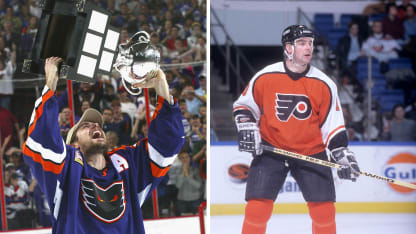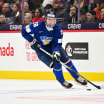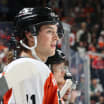Five years before Patrick Sharp raised the Stanley Cup on Wells Fargo Center ice to the chagrin of Flyers fans, he was celebrating another championship that made the fans much happier - that one being for the hometown Phantoms, with whom Sharp won the Calder Cup in 2005 in front of a sold-out building and a fan base that got entirely behind the Phantoms during the 2004-05 NHL lockout.
LeClair, Sharp eager to boost Flyers development
Flyers Senior Advisors John LeClair and Patrick Sharp met with the media on Wednesday

By
Brian Smith
philadelphiaflyers.com
It's all the experiences that led to those two championships, as well as the two additional Cups he won with Chicago, that he now looks to bring to Flyers prospects as a member of the team's development staff.
"When I look back at my career as a player, clearly the three Stanley Cups in Chicago stand out," Sharp said. "But that year in Philadelphia, that deep playoff run, the way the city got behind us and just the experiences I went through individually as a player, challenging myself, being competitive through four playoff rounds, that followed me around through the rest of my career and it helped me become the player that I later became. So my experience not only with the Flyers, but most importantly with the Phantoms, is something that I'm looking to pass along to our guys now."
Coincidentally, the Flyers announced the hiring of two of the biggest hockey alumni of the University of Vermont in quick succession. Sharp and John LeClair are both going to be part of the team's development staff along with Riley Armstrong, who's moved from an assistant coaching role under Ian Laperriere at Lehigh Valley to become the Flyers' director of player development, and Nick Schultz, who's been a player development coach with the club for a couple of years now.
"I've been fortunate enough to play in a lot of different situations between international stuff, world juniors, different levels as far as being a fourth liner, being scratched, up to being on the first power play and being a go-to guy in the lineup," LeClair said. "That's one of those things that helps me when talking to a guy. I've been on all sides of the game. I know what it's like to be scratched; I know what it's like when the coach benches you. Those are things you can kind of help these guys through. Everybody has ups and downs. You try to guide them and help them to get through those the best they can."
Both Sharp and LeClair are new to this specific title with an NHL club, but they both have vastly different bodies of experience that have prepared them for the role. Sharp got to know Jones when he became a studio analyst for NBC after retiring as a player in 2018, and credited Jones for helping him with the transition to life after playing - one that can be difficult for a lot of players. He's spent much of his retirement as an analyst, but he's also had an opportunity to get into player development already as a consultant at his alma mater. Vermont head coach Todd Woodcroft, the older brother of Edmonton head coach Jay Woodcroft, invited Sharp to work with the Catamounts two years ago.
"He gave me an incredible opportunity to track his team and his players and help out in any way," Sharp said. "He taught me how to watch games online, how to build tape. I had the green light to go to Burlington and be around the group and talk one-on-one with players. I did it probably a bit more in year four; last year I was a little more involved with the Blackhawks organization. But my experience working with Todd Woodcroft and the University of Vermont prepared me for life after broadcasting. It got me excited about rejoining a team again and working in the role that I currently am."
LeClair took a different route after retiring in 2007. He spent about 10 years as a player agent and has more recently been involved with 3ICE, a league of eight teams coached mostly by other players from LeClair's era that plays a summer schedule of 3-on-3 games around the country. This year's league championship weekend will be at Wells Fargo Center in August. He's now eager to be part of the next chapter of Flyers history.
"Things aren't good enough right now," LeClair said. "We're not where we want to be, and we need to get better. We have some pretty good talent that we can develop, and that's what we want to do. We want to try to get the most out of those guys, both for them and [the organization.] To be able to be a part of what's going on with the future, the vision of Danny and Jonesy, it's something I was very excited to be a part of, and I'm very happy to be here now."
Although the hires both have Flyers connections in their past, it's the other parts of their careers - the combined four Stanley Cups, the international play, and the time spent playing with other players that went on to Hall of Fame careers - that they will bring to the table in these roles. LeClair finished his career as a veteran presence in Pittsburgh supporting the first seasons of Evgeni Malkin, Sidney Crosby, and others, while Sharp had five or more years of pro experience when Patrick Kane and Jonathan Toews joined the Blackhawks. But they both join Jones and Briere in wanting to restore the Flyers' culture - not of playing like the Broad Street Bullies, but by being an organization that is modeled elsewhere around the NHL.
"Guys who have been here and understand the culture, we've gotten away from that a little bit," LeClair said. "We want to get back to the Flyers culture that we had that was bearing some winning seasons. It didn't bring us Cups, but we're going to get to that next step. That's what we want to do is get over that final threshold and win the Cup. But it seems like it's gone a little away from the culture we had, the excitement in the building, that family feel that we had when the Flyers were one of the top teams in the NHL. That's what we want to get back in a big way."
While LeClair returns to where he had his best years, Sharp returns to where it all started. Jones has called Sharp "one that got away" and has emphasized that the Flyers don't want to make any more mistakes like the one that sent Sharp to have his best years in Chicago. In this role, Sharp himself will help get players to a point where the Flyers hope to avoid doing that.
"When I left school I didn't know what was in store for me as far as the professional game," Sharp said. "I didn't know if I was going to make the NHL. That was the dream and the goal, to [but] I wasn't quite ready at age 20. I needed to learn a lot about living on my own away from the week, needed to learn a lot about being a professional and how to compete more consistently, and those are things that I did learn over parts of three seasons including one full season in 2005 when the Phantoms ultimately won the Calder Cup. So I feel like I've got great experience to relate to these players and help them on their journey."


















